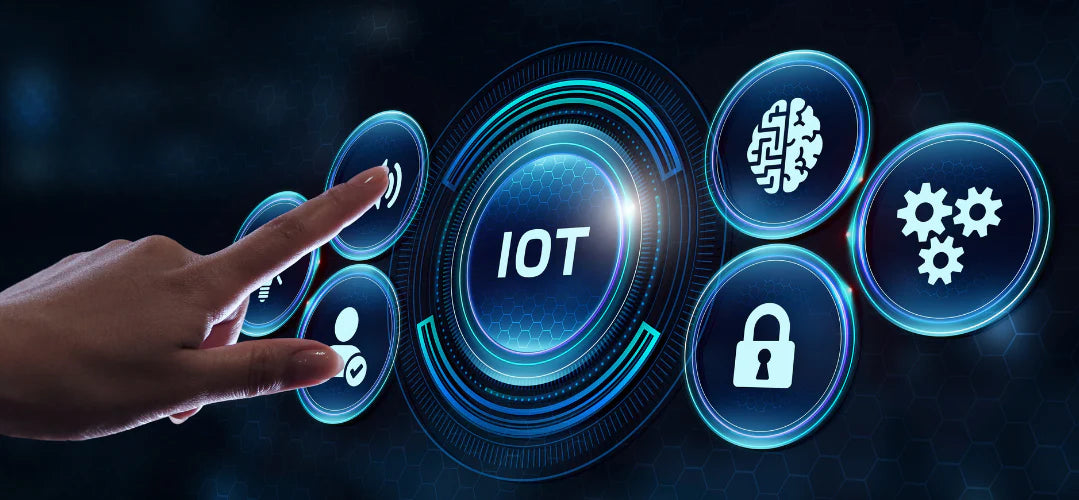
Transforming Homes: Exploring the Internet of Things (IoT) Devices and Smart Home Technology
Share
In today's digital age, our homes are becoming smarter than ever before, thanks to the Internet of Things (IoT) devices and smart home technology. From thermostats that adjust to your preferences to security cameras that keep watch over your property, the possibilities for enhancing convenience, comfort, and security are endless. Join us on a journey as we explore the exciting world of IoT devices and smart home technology, and discover how they are revolutionizing the way we live.
The Rise of IoT Devices: The Internet of Things refers to the network of interconnected devices that can communicate and exchange data with each other over the internet. These devices, equipped with sensors, actuators, and connectivity features, enable us to monitor, control, and automate various aspects of our lives. In the realm of smart homes, IoT devices play a pivotal role in transforming traditional household appliances and systems into intelligent, interconnected entities.
Key Components of Smart Home Technology: Smart home technology encompasses a wide range of devices and systems designed to enhance the functionality and efficiency of our living spaces. Some of the key components include:
-
Smart Thermostats: These devices learn your heating and cooling preferences and automatically adjust the temperature to optimize comfort and energy efficiency.
-
Smart Lighting: With smart lighting systems, you can remotely control your lights, set schedules, and create custom lighting scenes to suit different activities and moods.
-
Smart Security Cameras: Keep an eye on your home from anywhere with smart security cameras that offer live streaming, motion detection, and two-way audio communication.
-
Smart Locks: Say goodbye to traditional keys and hello to smart locks that allow you to lock and unlock your doors remotely, grant access to guests, and monitor entry activity.
-
Smart Appliances: From refrigerators with built-in cameras to washing machines that can be controlled from your smartphone, smart appliances offer enhanced convenience and efficiency.
-
Voice Assistants: Voice-controlled smart speakers and virtual assistants like Amazon Alexa and Google Assistant enable hands-free control of your smart home devices and provide access to a wide range of services and information.
Benefits of Smart Home Technology: The adoption of smart home technology offers a multitude of benefits for homeowners:
-
Convenience: With the ability to control your home's systems and appliances from anywhere using your smartphone or voice commands, smart home technology makes everyday tasks more convenient and efficient.
-
Energy Efficiency: Smart thermostats, lighting, and appliances help reduce energy consumption by optimizing usage patterns and adjusting settings based on occupancy and environmental conditions.
-
Security: Smart security cameras, locks, and alarm systems provide enhanced protection for your home, deterring intruders and alerting you to potential threats in real-time.
-
Peace of Mind: Whether you're at work or on vacation, smart home technology allows you to monitor and manage your home remotely, giving you peace of mind knowing that everything is safe and secure.
-
Customization: With the ability to customize settings and preferences for each device and system, smart home technology enables you to tailor your living environment to suit your lifestyle and preferences.
Challenges and Considerations: While the benefits of smart home technology are undeniable, there are also some challenges and considerations to keep in mind:
-
Cost: The initial investment required to purchase and install smart home devices can be significant, although prices have been steadily decreasing as the technology becomes more widespread.
-
Compatibility: Not all smart home devices are compatible with each other or with existing home automation systems, so it's essential to research compatibility before making purchases.
-
Security Concerns: As with any connected device, smart home technology can be vulnerable to cybersecurity threats, so it's crucial to implement robust security measures and keep devices updated with the latest firmware and software patches.
-
Privacy: Smart home devices collect data about your usage patterns and preferences, raising privacy concerns about how this data is stored, shared, and used by manufacturers and third parties.
-
Reliability: While smart home technology has come a long way in terms of reliability and performance, occasional glitches and connectivity issues can still occur, requiring troubleshooting and maintenance.
The Future of Smart Homes: As technology continues to advance and consumer demand for smart home solutions grows, the future of smart homes looks brighter than ever. Innovations such as artificial intelligence, machine learning, and edge computing are poised to further enhance the capabilities of smart home devices, making them even more intuitive, responsive, and seamlessly integrated into our daily lives.
In addition to improving convenience, comfort, and security, smart home technology has the potential to promote sustainability and reduce environmental impact by optimizing energy usage and resource consumption. From reducing carbon emissions to conserving water and minimizing waste, smart homes can play a significant role in creating a more sustainable future for our planet.
Conclusion: In conclusion, the Internet of Things (IoT) devices and smart home technology are transforming the way we live, offering unparalleled convenience, comfort, and security. From thermostats and lighting to security cameras and voice assistants, the possibilities for enhancing our homes with smart technology are virtually limitless. While there are challenges and considerations to navigate, the benefits of smart home technology far outweigh the drawbacks, making it an exciting and worthwhile investment for homeowners looking to embrace the future of living. As we continue to embrace innovation and technological advancements, the smart home of tomorrow promises to be smarter, more efficient, and more connected than ever before.
For more on smart home technology and the latest in tech news, subscribe to our blog.
